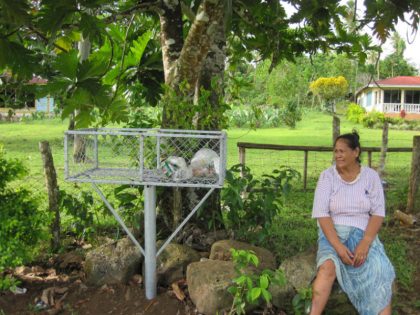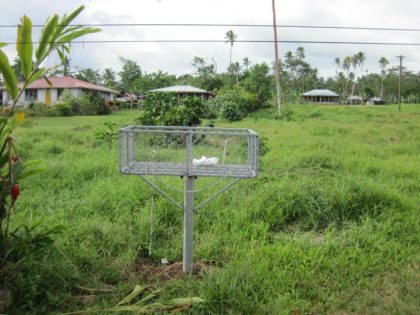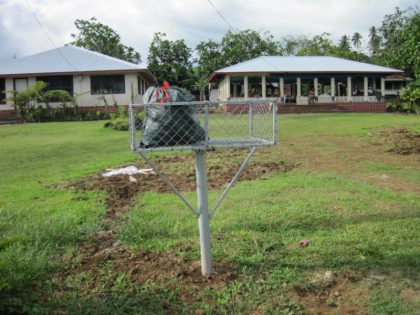 This project has been completed under the direction of Peace Corps Volunteer David Nacmanie. To read about the beginning of the project, CLICK HERE.
This project has been completed under the direction of Peace Corps Volunteer David Nacmanie. To read about the beginning of the project, CLICK HERE.
The project was to manage the solid waste in the community to protect the river.
David reports:
The Mulivai Sanitation and Water Protection Project was initiated and completed by the Mulivai Catholic Youth Group (Mulivai Autalavou a le Lotu Katoliko), with the assistance of the village Peace Corps Volunteers, David Nacmanie and Karen Corey.
The project called for the construction of rubbish stands, which are elevated platforms that rubbish bags can be placed on to await pickup. Elevated stands are necessary to keep dogs and pigs from ripping open the bags and scattering garbage everywhere. The garbage can then pollute the local source of drinking water.
The initial plan for the project was to construct the rubbish stands out of used
shipping pallets. However, after discussion with other Peace Corps Volunteers and other villages, the autalavou decided that constructing metal stands with chain‐link enclosures at the top would be more effective. Although these stands were more expensive, the stands will last longer, are more effective at trapping rubbish, and are more attractive.Materials were transported on the village bus. Male members of the autalavou began construction of the stands on a Monday evening, with work continuing during the week. Construction was completed by Saturday morning and all stands were installed that day.
Because of the increased cost of the materials, only five stands were constructed. The autalavou installed two large stands for areas with especially high rubbish production – the church and the road that leads to the school. The church is located centrally in the village, so one stand serves quite a few families in addition to the church. The school produces a lot of rubbish, which can now be placed on the rubbish stand. In addition, the four families that live up the school road now have an appropriate place to dispose of their rubbish. The three smaller stands were placed in front of houses.
Since the installation of the stands, they have been consistently used by the villagers living near them, including the school children. Many of the villagers have also requested their own rubbish stands. They have praised the design and work done by the autalavou.
In the next month, the autalavou will hold a rubbish clean‐up campaign. They will also work together with the women’s committee to clean up the vaita’ele, the swimming and washing area of the river. They also are searching for funds to build more rubbish stands for the rest of the village.
We wish to thank David for completing this project, and again extend our gratitude to The Soneva SLOW LIFE Trust for providing the funding.

